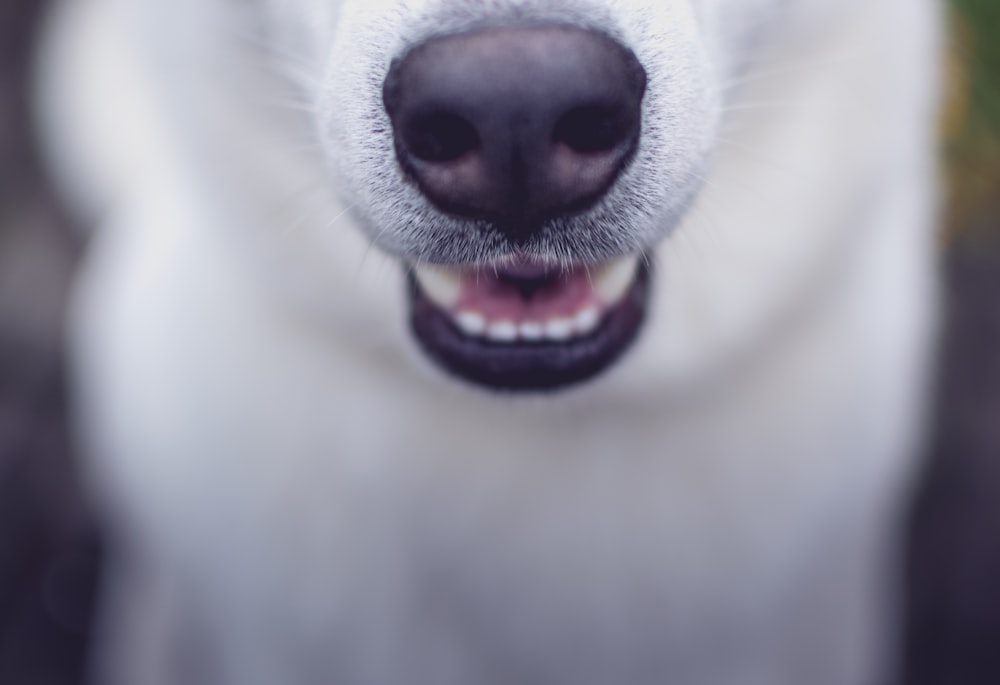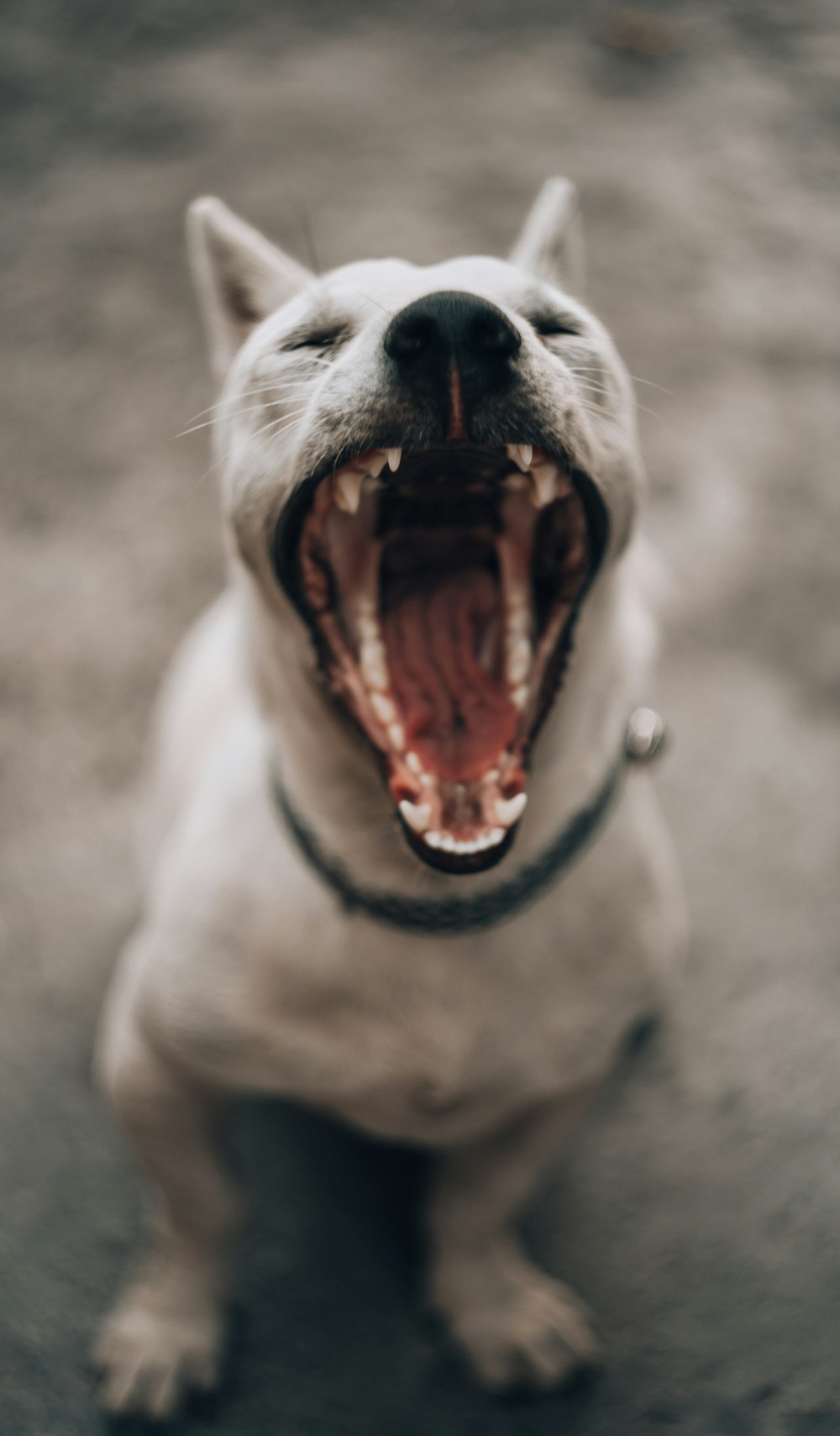Do you brush your dog’s teeth? Just like people, dogs need regular dental care. Unfortunately, dog dental care often falls by the wayside among other chores and activities. People seem to accept that dogs have bad breath when in reality most dogs just don’t get their teeth brushed often enough.
Dental care is just as important as proper nutrition, exercise, and grooming that your dog needs to thrive.

Why Do Dogs Have Bad Breath?
Just like in humans, plaque builds up on a dog’s teeth and turns into hard tartar. Plaque and tartar provide a protective covering for bacteria that eat away at the teeth and gums. This can lead to dental issues like halitosis (chronic bad breath) as well as oral pain, periodontal disease, and tooth loss. This bacteria doesn’t just harm the mouth, it can also negatively affect the heart and kidneys.

Dental Care: Inspecting Your Dog’s Teeth
Catching teeth problems early can help you avoid severe dog dental problems later on. The simplest way to note changes in your dog’s teeth and gums is to look at them on a regular basis and know the signs of common dog dental issues.
To inspect your dog’s teeth, lift their lips up all around their mouth. Look at the front and back teeth as closely as possible, especially the gumlines. Be gentle and be aware of your dog’s reaction. It’s best to get them used to this kind of inspection at a young age so they become used to the procedure. The more familiar you are with your dog’s teeth and mouth, the more likely you are to notice potentially harmful changes.
How To Brush Your Dog’s Teeth
While there are other dog dental cleaning methods, brushing your dog’s teeth on a daily basis is the best tried and true method for upkeeping your dog’s dental hygiene. A double-headed toothbrush works best, but any toothbrush works better than no toothbrush. It’s important to clean your dog’s teeth from top to bottom, paying special attention to the gumline. A toothbrush made specifically for dogs, with a 45-degree angle, will work best for this.
It’s best to familiarize your dog with getting his or her teeth brushed as a puppy. They likely won’t tolerate much at first, but start slowly and work your way up to a full cleaning. If your dog is not a puppy, you can still teach them that teeth-brushing is just another part of the day. Here are some tips to get your dog used to daily dental cleanings:
- Tire your dog out beforehand. A tired dog is a well-behaved dog, and you want your pup as pooped as possible before you try a teeth-brushing. This will give you the best chance of your dog sitting still while you try to brush their teeth.
- Start slowly. Do a little at a time, making the experience as positive for your dog as possible. Don’t be discouraged if you don’t get through cleaning your dog’s entire mouth. You may only do a small amount of brushing the first day, but just work up to doing a little more each day until your dog is comfortable getting their teeth brushed. Read more tips on training new behaviors here.
- Make it fun. Speak to your dog in soothing, positive tones while you brush their teeth. Give them plenty of positive attention to put them at ease.
- Start early. Teaching your puppy to tolerate getting their teeth brushed will save you a lot of time and effort later on.
Note: Do NOT use human toothpaste to clean your dog’s teeth. Human toothpaste contains fluoride, which is very toxic to dogs. Toothpaste formulated specifically for dogs can be found in most pet stores.

Dry Dog Food is Better than Soft Food
We all want to feed our dogs the best possible diet to meet their nutritional needs. Dog food options usually include wet food, semi-moist food, and dry kibble. Dry kibble has no water added and as a result, has higher concentrations of protein and other nutrients. This type of dog food is by far the most practical, requiring no refrigeration. Dry kibble is more cost-effective, still easy to digest, and helps clean your dog’s teeth.
Regular Dog Dental Cleanings At the Vet
In addition to looking at your dog’s mouth periodically, you should note any changes that may indicate a dental issue. Some signs to look for include:
- chronic bad breath
- change in eating or chewing
- lethargy
- excessive drooling
- missing teeth
- discolored, broken, or crooked teeth
- red, swollen, or painful gums
- yellow-brown tartar along the gumline
- bumps or growths inside the mouth
If you observe any of the signs above, you should consult your veterinarian. Even if they show no signs of dental issues, your dog should have a yearly dental cleaning from a licensed veterinarian. As our dogs age, they may benefit from dental cleanings from a veterinarian even more often, as older dogs are more prone to periodontal disease.

Other Ways To Combat Dog Dental Issues
Though daily brushings are the best way to control plaque and tartar buildup, there are a couple of additional measures you can take to keep your dog’s teeth clean.
Dental Chews
Dog dental chews, like Greenies, can help keep your dog’s teeth clean and breath fresh. Just make sure the dental chew is easily digestible and size-appropriate for your dog. The chew should be large enough that it takes several minutes of chewing to get through and not small enough that your dog could choke on it. Many brands sell their dental chews with recommended dog size or weight right on the package. For best results, you must feed your dog the dental chew on a daily basis.
Water Additive
You can also use food and water additives specifically designed for dog dental health. These additives must also be used on a daily basis to have the desired result. Check the package for instructions on how often to change water out of a bowl with an additive in it.
Dental Care Is Essential For Dogs
Just like dogs need nutritious food to eat, plenty of exercise, and regular grooming, dental care is an essential part of keeping your dog healthy. Not only will a dog with a clean mouth have much better-smelling breath, but they will also avoid potentially fatal problems later in life. Dental cleanings only take a few minutes, but they could give you additional years with your canine companion.
